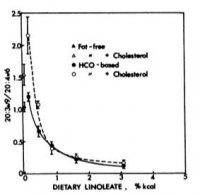When PUFA intake drops down to a minimum, how long does it take for mead acid production to begin? Is it fairly quick, or does the body have to run through it's "PUFA Stores" if such a thing exists?
When consuming PUFA, what's the upper limit of consumption that might still allow for mead acid production? At an intake of 2500kcal, 5 grams of total PUFA would be around 1.8% of the dietary calories -- how far away is this from "essentially fatty acid deficiency" ? Do any of the polyunsaturated fats have differing effects on mead acid synthesis? (Eg. is there a difference for inhibiting mead acid production if that was primarily omega-6 from animal fat, vs omega-6 from plant fat, vs omega-3 from plant fat, vs omega-3 from animal fat?)
When consuming PUFA, what's the upper limit of consumption that might still allow for mead acid production? At an intake of 2500kcal, 5 grams of total PUFA would be around 1.8% of the dietary calories -- how far away is this from "essentially fatty acid deficiency" ? Do any of the polyunsaturated fats have differing effects on mead acid synthesis? (Eg. is there a difference for inhibiting mead acid production if that was primarily omega-6 from animal fat, vs omega-6 from plant fat, vs omega-3 from plant fat, vs omega-3 from animal fat?)


